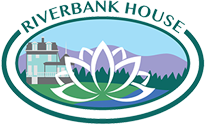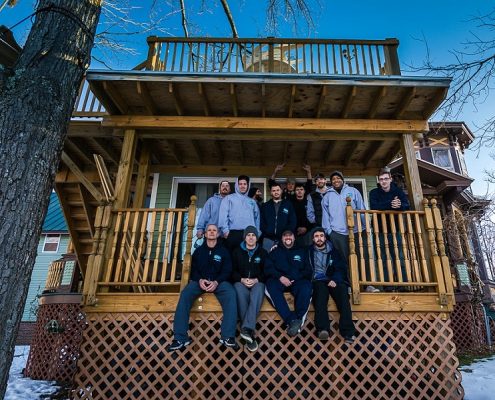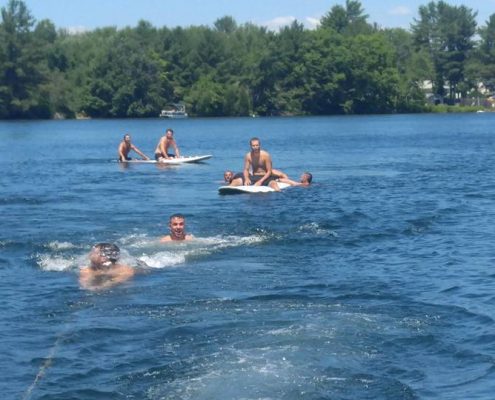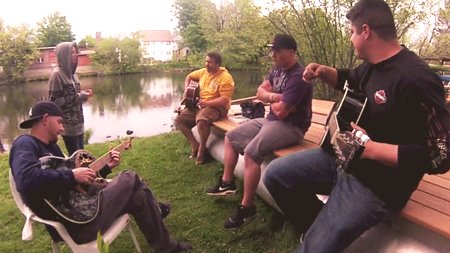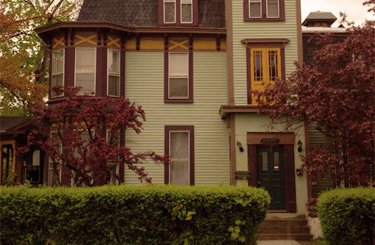WHAT CLIENTS SAY ABOUT THE RIVERBANK HOUSE EXTENDED CARE COMMUNITY EXPERIENCE
By the time I was willing to admit that I was an addict, I was miserable without drugs or alcohol, and reckless when I had them. I was convinced that life wasn’t even worth living. I had seen the destruction caused by addiction first-hand throughout my childhood. Helplessly, I witnessed manipulation, abuse, and neglect of my siblings taking place in the household, all due to drugs- so, I promised myself that I would never make the same choices.
I began drinking and using drugs at the age of 14. A couple beers and smoking pot eventually turned into blackouts, and chasing my next high, whatever it may be. At the age of 22, I finally asked for help, and entered my first treatment facility in 2017. After a year of countless attempts to remain sober I enrolled in two more treatment programs in 2018. I had never understood the importance of a spiritual life until I found AA, and unfortunately, I didn’t have much of an opportunity to be involved with AA in these treatment facilities.
Luckily for me, after my last relapse, I was given the opportunity to attend Riverbank beginning February 21st, 2020. The Riverbank community has been welcoming from the start, and remains involved in a variety of meetings daily, such as: AA, NA, HA, etc. They offer: yoga classes, meditation, a gym, kayaking, hikes, and the list goes on. All of these options have been crucial to helping me find who I am as a person, and what positively influences my recovery. In addition, the community of staff and residents provide excellent mental support and accountability to my recovery. Today, I’m stronger than I’ve ever been, and constantly
discovering what makes me happy. Reflecting upon my recovery from the beginning, nothing can compare to my experience at Riverbank, or the support that I’ve received here. If you’re struggling with addiction, don’t give up, and be sure to ask for help. Attend a treatment program that offers the resources that you need to get sober. Lastly, when you’re ready, be available to help the addict who is still suffering – you could save their life.
I showed up at the Riverbank House in October of 2016. I’d tried everything to get sober at that point. I’d been to several rehabs, countless detoxes, multiple sober houses, doctors, psychologists, etc. None of my attempts to sober up lasted longer than a few months. I had very little faith that my experience at The Riverbank House would be any different. I was so wrong.
I don’t believe Riverbank ‘saved my life’. They didn’t try to. So many of the treatments I’d tried before were aimed at ‘fixing me’, which proved utterly useless. The Riverbank House didn’t try to fix me or save my life. They gave me the tools and support I so desperately needed to save my own life when I was ready to do so. I’ve been sober since October 2016 and I owe so much of that to my experience at The Riverbank House. I am forever grateful to them for the life they’ve given me today.
For most of my life, I’ve held on to the illusion that I can figure out any problem on my own. Lock me in a room with a computer and a few books, and even the most complex problems could be solved by my own perspicacity. But as my life grew unmanageable in the throes of my addiction to alcohol, I became hopeless. Numb to life, apathetic, and far too prideful to ask for help. That’s when people who love me intervened on my behalf. First, I tried a 30-day program outside of my hometown, but I only got sober enough to get my wits about me. The fog cleared and I returned to my old way of handling everything by myself. After a few meager attempts, my family heard about Riverbank through recommendation on the web.
Now, mind you I’m from Texas, so I had no idea what to expect from New Hampshire. I packed a couple ponchos, my cowboy hat, my snakeskin boots, and began a real earnest attempt at sobriety. The first thing about Riverbank that stood out was the staff. Unlike other treatment facilities I have tried, my mentors are all in recovery and are nearly all are from the Riverbank program itself. This offered a unique insight and instant relatability because at any point in the day, I could pull aside my peers and verbalize my thoughts and emotions. This helps me tremendously by allowing me to recognize and acknowledge the small things that bother me accumulate into larger problems that I cannot handle. From there, the emphasis on meditation and processing gives me the tools to manage my thoughts and emotions before they become overwhelming. Daily meditation, physical activity, and cooking are what remind me that sober life is a good life, and Riverbank set me up with those tools and the power to make life enjoyable. I am filled with gratitude.
I remember as a young man being acutely aware that I felt somehow different than my peers. I could not understand the source of the feeling, but at times it would overwhelm my daily thinking and action. My dream was not to be an addict or alcoholic. My dream was to work on Wall Street, driven by material possessions, power and prestige. As I achieved these ends, I realized I was more lost than ever. The emptiness that existed inside of me grew larger and more profound. I used substances to mask the insecurity. The perpetual state of intoxication caused me to lose touch with reality and hurt my family, my friends and myself. When I attempted to first get sober my coping mechanism via drugs and alcohol were taken out of the equation. I was left feeling alone and hopeless.
I went to a few treatment centers. Failed at attempts to get sober. All the therapy in the world seemed to be unable to “fix” me. I felt that I was a victim of life and circumstance. Until I arrived at The Riverbank Community.
Upon arrival here I was broken and beat down. I believed there was no way I would ever overcome the uphill battle that lay ahead. The men of this community pushed me with empathy and understanding to be my best self. The first two months it was a struggle to get out of bed. I was held accountable by the other members of the community to get up and participate. As a man I felt that sharing my emotions with others was completely inappropriate and unacceptable, but what I found was that I was surrounded by people who shared the same struggles that I was experiencing. I was instructed to pull-up my bootstraps and face the days. It started to become second nature to view each day as an opportunity instead of a string of moments to be endured. At some point early in my stay, the staff saw something promising in me that I could not see in myself.
I was offered a job as an Advocate at Riverbank. I learned to be accountable to not only to myself, but to a community of men who are working towards long-term sobriety. What I was not immediately aware of at the time of accepting the position was that I was being presented an opportunity to be of service to others every single day. This is something I am filled with gratitude for today. As the future unfolded, I was offered more and more responsibility. I now sit as a director of The Riverbank Community and I have never experienced fulfillment daily as I do now. We as a team and community strive every single day to lean on each other and chase sobriety together. Every member of our staff has been through the Riverbank program, which creates a sense of purpose and community which is unrivaled. The future holds bright things for all of us. I never thought I would be able to believe that with my whole heart.
Explore the Riverbank House Difference
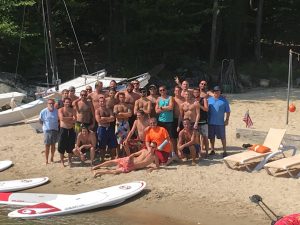
WELCOME to a revolutionary standard in residential addiction recovery support for men. Innovative. Affordable. Effective. Grounded by spirituality and science. Join us, and rekindle the will to live!
Retrain the Brain. Repair the Body.
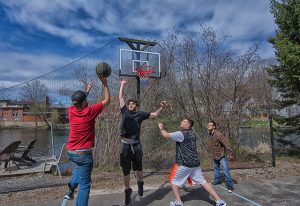
SHARED ADVENTURE, brotherhood, and challenge: at Riverbank House the pursuit of constructive passions is fundamental to our recovery. The damage of active addiction is very real. We offer a comprehensive program of activity designed to stimulate healing at every level — spiritual, physical, social, emotional, and neurological.
Career Path Training and Employment Experience
FIND YOUR PASSION. Riverbank House affiliate businesses allow residents to explore and experience a wide variety of careers. Whether you enjoy working with your hands or a keyboard, working outdoors or behind a desk, serving up lunch or a sunset cruise on the lake, Riverbank House can help you experience the satisfactions of rewarding employment and professional growth.
Our Recovery Neighborhood
Riverbank House Recovery Community for men is located in the little city of Laconia, in the heart of the beautiful Lakes Region of New Hampshire. Once a vibrant New England mill town in the 1800s, Laconia has matured into a four seasons recreational resort and antique shopping destination. The city boasts four lakes, twenty parks, and four public beaches. Our campus is situated along the banks of the gentle waterway connecting Lake Opechee to Lake Winnisquam, just a few blocks from Laconia’s quaint downtown, the Public Library, Lakes Region General Hospital, churches, groceries, post office, ball fields, cafes, restaurants, and more than two dozen weekly 12-step meetings.
Why Long-Term Care is Essential to Addiction Recovery

Many of us are familiar with the traditional 28-day treatment model that emerged decades ago when major insurance companies dictated the length of stay for substance misuse disorders. Experts in the field of addiction science now agree that the current opioid epidemic of addiction and overdose requires a different model of recovery care. At Riverbank House, we offer the traditional 28-day stay while encouraging men to remain within our community for the 90 days or more now recommended by experts. We are so passionately committed to the effectiveness of long-term care that — unlike many programs — we are truly motivated to keep Riverbank House affordable and cost-effective for our residents.
An Approach Grounded in Both Spirituality and Science

At Riverbank House, our Four Guiding Principles reflect our commitment to saving lives through effective care, sustainable recovery, and emerging research in the field of addiction science. We don’t chase the latest fads and we don’t entrench ourselves in the past. At Riverbank House we work diligently to balance the well-established spiritual approach to recovery with new understandings and evidence-based recommendations from experts. To keep it simple, we’ve distilled our approach into four fundamentals values.
Are You Paying for Addiction Treatment But Only Getting Treatment for Dependence?

TREATMENT FOR OPIOID DEPENDENCE IS NOT TREATMENT FOR OPIOID ADDICTION. In the context of drug treatment, we seem to understand that you can be opioid dependent without being opioid addicted (in, say, the case of a terminally ill cancer patient).
But sometimes we forget – with the encouragement of insurance companies – that opioid addiction is still very much a problem even if we are no longer opioid dependent.
The person who is no longer opioid dependent — as a result of successful detox – is still very much opioid addicted.
Choosing an Effective Sober House

Detox, rehab, and then what? If experts recommend long-term addiction recovery care of 90 days or more, where do sober houses fit on the path to recovery? And how does one choose a sober living home that will capitalize on the hard earned recovery achieved in rehab? Ideally, transition housing should offer structure and support while allowing a resident to practice the tools of recovery in the “real” world. Making an informed choice in sober living might be as important as making a wise choice when selecting a rehab or treatment center.
RECENT BLOG POSTS
Our Mission Statement
A quality residential experience, resident collaboration, and a holistic approach to wellness provide members of Riverbank House Extended Care Recovery Community with guidance and structure as together participants establish and develop the essential practices – spiritual, emotional, and physical – necessary for a full life of vibrant, sustainable recovery, free from addiction and self-destruction.
Our Philosophy
Riverbank House Extended Care Recovery Community recognizes that freedom from addiction and self-destruction requires life-long commitment and vigilance. While our program is founded upon the Twelve Steps of Alcoholics Anonymous, we honor the many-pathways-to-recovery approach endorsed by experts. We stay mindful of our recovery through exploration into the principles of Buddhism; the daily practice of meditation and Yoga; a community code of non-aggression, collaboration, accountability, and mutual respect; self-reflection; and the pursuit of constructive passions.
